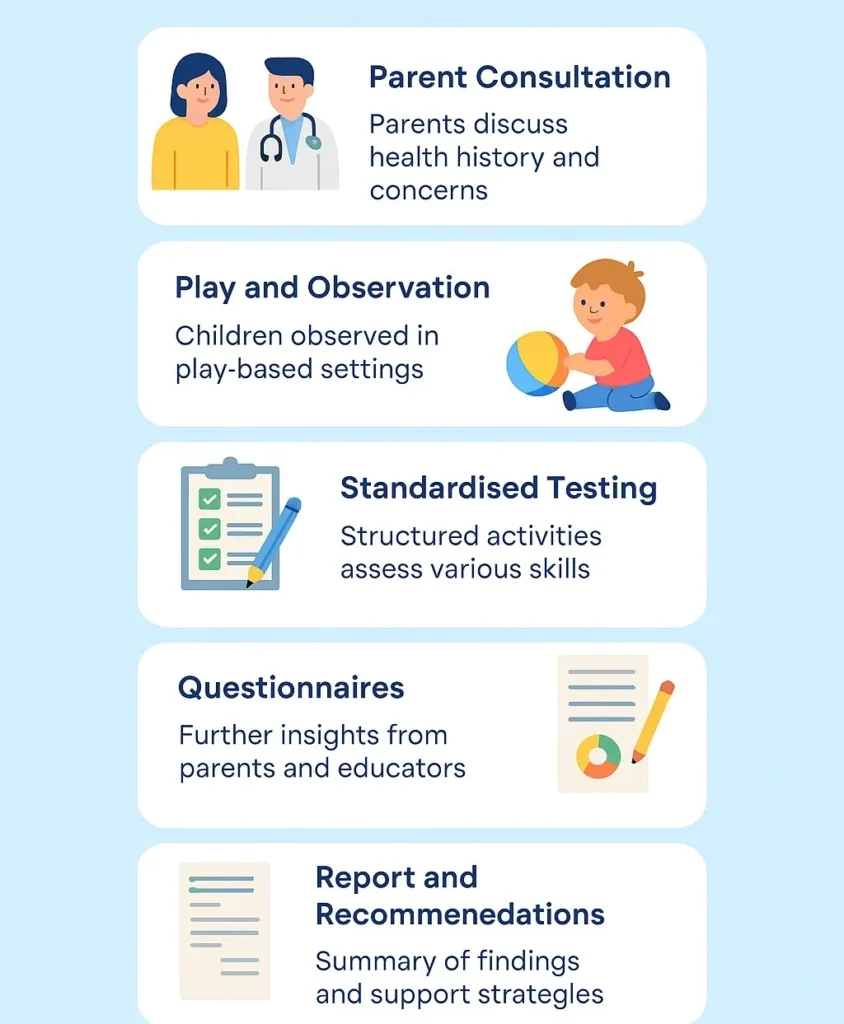Comprehensive Paediatric Assessments: Early Diagnosis and Support for Your Child’s Development
Every parent wants to give their child the best start in life. From learning to talk to building social skills to succeeding at school, every stage matters. When concerns arise about development, parents need answers.
This is where Comprehensive Paediatric Assessments become essential. They provide a detailed understanding of a child’s strengths and challenges, helping families take the right steps early.
Why Comprehensive Paediatric Assessments Matter
Early identification of developmental delays can change a child’s future. The Australian Early Development Census reports that 22% of children entering school show vulnerability in at least one developmental area, such as language, motor skills, or emotional regulation.
With early intervention, children are more likely to:
- Keep pace academically
- Build stronger communication skills
- Develop independence
- Thrive socially and emotionally
This is why early paediatric evaluations play such a crucial role — they empower parents with clarity and direction.
What Do Comprehensive Paediatric Assessments Include?
Unlike routine check-ups, detailed paediatric evaluations explore all aspects of a child’s development. They typically include:
- Medical history and background review
- Cognitive skills such as memory and problem-solving
- Communication and language development
- Motor skills and coordination
- Social and emotional growth
- Daily life and independence
By combining input from different specialists, families receive a complete picture of their child’s needs.
Signs That an Assessment May Be Needed
Parents don’t always know when to seek help. Some common signs include:
- Limited speech or slow language development
- Difficulty making friends or interacting socially
- Challenges with fine motor or gross motor skills
- Trouble focusing or following instructions
- Frequent emotional outbursts or behavioural struggles
When these issues persist, Comprehensive Paediatric Assessments can provide answers and a path forward.
The Process of a Comprehensive Paediatric Assessment

Step 1: Parent Consultation
Parents share health history, concerns, and observations.
Step 2: Play and Observation
Children are observed in natural, play-based settings.
Step 3: Standardised Testing
Structured activities measure skills across different areas.
Step 4: Questionnaires
Parents and educators contribute further insights.
Step 5: Report and Recommendations
A detailed report outlines strengths, challenges, and support strategies.
This structured approach makes Comprehensive Paediatric Assessments both thorough and child-friendly.
Real Statistics That Show the Need
The importance of assessments is supported by evidence:
- 1 in 5 Australian children aged 2–14 live with disability, many related to development.
- 7–10% of children experience developmental language disorder.
- 1 in 70 Australians are diagnosed with autism, often in early childhood.
- Up to 5% of children live with ADHD, affecting focus and learning.
These figures highlight why families should not wait. Accessing Paediatric Assessments Australia early can make a lasting difference.
The Role of Allied Health Specialists
Assessments often involve a team of allied health professionals, such as:
- Speech pathologists for communication challenges
- Occupational therapists for motor and daily skills
- Psychologists for learning and emotional well-being
- Physiotherapists for movement and coordination
Each plays an important role in shaping the outcomes of Comprehensive Paediatric Assessments.
From Diagnosis to Action
An assessment is just the beginning. The real impact comes from using the recommendations:
- Therapy sessions matched to needs
- School-based adjustments for learning support
- Home strategies for behaviour and communication
- Ongoing monitoring of progress.
This ensures children receive the right interventions at the right time.
Emotional Support for Parents
Seeking an assessment can feel overwhelming. Parents may fear a diagnosis or worry about the future. But most families feel relieved once they understand what’s happening.
Comprehensive Paediatric Assessments provide clarity, replacing uncertainty with a clear action plan. This support often brings hope, empowerment, and confidence for the entire family.
How Iconic Care Can Help
In Australia, families can access expert services through trusted providers. Iconic Care offers Comprehensive Paediatric Assessments at their Kids Clinic, combining professional expertise with a compassionate, child-focused approach. Their team helps parents move from concern to confidence by providing answers and actionable strategies.
Conclusion
Every child deserves the chance to reach their full potential. Comprehensive Paediatric Assessments are not about labels; they are about understanding and support.
By identifying challenges early, families can provide the right interventions to help children succeed at home, in school, and in life. With professional guidance and the right team, children can grow with confidence, resilience, and a hopeful outlook for the future.
Frequently Asked Questions
1. What is a Comprehensive Paediatric Assessment?
It’s a comprehensive evaluation of a child’s development, encompassing learning, communication, motor skills, and emotional well-being, to identify strengths and areas for improvement.
2. Why are paediatric assessments important for children?
They help detect developmental delays and behavioural concerns early, allowing parents and professionals to provide timely support and improve outcomes.
3. At what age should my child have a paediatric assessment?
Assessments can be done at any age, but early childhood (0–6 years) is the best time, as early intervention leads to stronger progress.
4. What happens after the assessment?
Parents receive a clear report with findings and tailored recommendations, including therapy options and support strategies for the child’s growth.